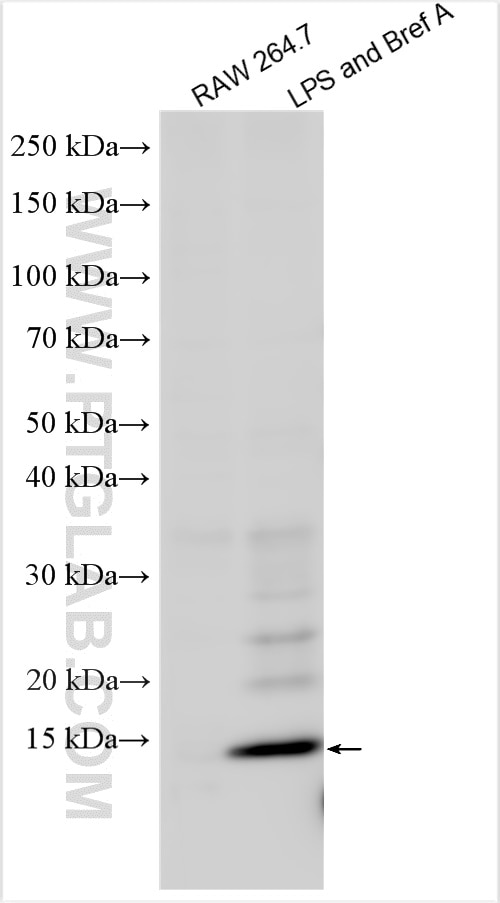Anticorps Polyclonal de lapin anti-TNF-alpha
TNF-alpha Polyclonal Antibody for WB, ELISA
Hôte / Isotype
Lapin / IgG
Réactivité testée
souris et plus (1)
Applications
WB, IHC, IF, ELISA
Conjugaison
Non conjugué
N° de cat : 26162-1-AP
Synonymes
Galerie de données de validation
Applications testées
| Résultats positifs en WB | cellules RAW 264.7, |
Dilution recommandée
| Application | Dilution |
|---|---|
| Western Blot (WB) | WB : 1:500-1:1000 |
| It is recommended that this reagent should be titrated in each testing system to obtain optimal results. | |
| Sample-dependent, check data in validation data gallery | |
Applications publiées
| WB | See 6 publications below |
| IHC | See 2 publications below |
| IF | See 1 publications below |
Informations sur le produit
26162-1-AP cible TNF-alpha dans les applications de WB, IHC, IF, ELISA et montre une réactivité avec des échantillons souris
| Réactivité | souris |
| Réactivité citée | rat, souris |
| Hôte / Isotype | Lapin / IgG |
| Clonalité | Polyclonal |
| Type | Anticorps |
| Immunogène | TNF-alpha Protéine recombinante Ag24089 |
| Nom complet | tumor necrosis factor |
| Poids moléculaire observé | 17 kDa |
| Numéro d’acquisition GenBank | NM-013693 |
| Symbole du gène | TNF-alpha |
| Identification du gène (NCBI) | 21926 |
| Conjugaison | Non conjugué |
| Forme | Liquide |
| Méthode de purification | Purification par affinité contre l'antigène |
| Tampon de stockage | PBS with 0.02% sodium azide and 50% glycerol |
| Conditions de stockage | Stocker à -20°C. Stable pendant un an après l'expédition. L'aliquotage n'est pas nécessaire pour le stockage à -20oC Les 20ul contiennent 0,1% de BSA. |
Informations générales
TNF, as also known as TNF-alpha, or cachectin, is a multifunctional proinflammatory cytokine that belongs to the tumor necrosis factor (TNF) superfamily. It is expressed as a 26 kDa membrane bound protein and is then cleaved by TNF-alpha converting enzyme (TACE) to release the soluble 17 kDa monomer, which forms homotrimers in circulation. It is produced chiefly by activated macrophages, although it can be produced by many other cell types such as CD4+ lymphocytes, NK cells, neutrophils, mast cells, eosinophils, and neurons. It can bind to, and thus functions through its receptors TNFRSF1A/TNFR1 and TNFRSF1B/TNFBR. This cytokine is involved in the regulation of a wide spectrum of biological processes including cell proliferation, differentiation, apoptosis, lipid metabolism, and coagulation. Mouse and human TNF-alpha share 79% amino acid sequence identity. Unlike human TNF-alpha, the mouse form is glycosylated. In mouse deficiency of this gene is associated with defects in response to bacterial infection, with defects in forming organized follicular dendritic cell networks and germinal centers, and with a lack of primary B cell follicles.
Protocole
| Product Specific Protocols | |
|---|---|
| WB protocol for TNF-alpha antibody 26162-1-AP | Download protocol |
| Standard Protocols | |
|---|---|
| Click here to view our Standard Protocols |
Publications
| Species | Application | Title |
|---|---|---|
Biochem Biophys Res Commun Uric acid-lowering effect of harpagoside and its protective effect against hyperuricemia-induced renal injury in mice | ||
J Control Release Microenvironment-responsive nano-bioconjugated vesicles for the multi-pronged treatment of liver fibrosis | ||
ACS Appl Mater Interfaces Evaluation of the Antibacterial, Anti-Inflammatory, And Bone-Promoting Capacity of UiO-66 Loaded with Thymol or Carvacrol | ||
Cell Mol Biol Lett Single-cell view and a novel protective macrophage subset in perivascular adipose tissue in T2DM | ||


